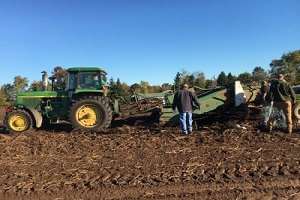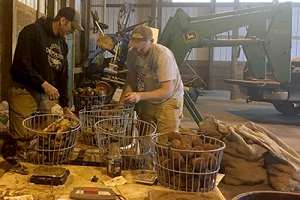By Monica Jean
Michigan State University Extension conducts multi-location field trials every year to evaluate new potato varieties. The Upper Peninsula location for trials was at TJJ Farms in Cornell, Michigan, operated by Tony and Joe VanDamme. In 2016, 32 different varieties of red, russet and yellow tuber types were planted and compared to industry stand varieties. In the field trial, every variety was sized according to the tuber type, evaluated for yield and quality, and were rated for vine vigor and maturity.

The potato trial was planted May 24 and harvested Oct. 3. The region gained two weeks in heat accumulation compared to previous years with a growing degree-day (GDD) accumulation for base 40 degrees Fahrenheit of 2,762. Regional rainfall beginning in April accumulated 19.5 inches, compared to the five-year average of 17.8 inches. This growing season has been moderately successful for potato farmers with a one-to-two-week earlier-than-normal harvest and good yields.
The results of the variety trial were on par with farmers’ results for yield and quality. The Dakota Ruby, a dark red skinned variety with bright white flesh, yielded 362 cwt/a US#1 with 67 percent A and 31 percent B size tubers. With a specific gravity of 1.078 and good sizing, the Dakota Ruby would be a good variety for table use. The top three russet varieties all yielded around 500 cwt/a US#1 and above, with ND050032-4Rus yielding 542 cwt/a US#1. Specific gravity ranged from 1.085-1.087, possibly making these varieties good candidates for French fry production. A06862-18VRRus had a very vigorous vine with early emergence and late maturity.
